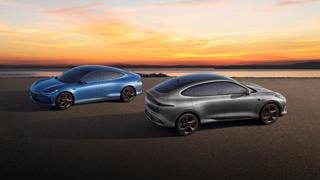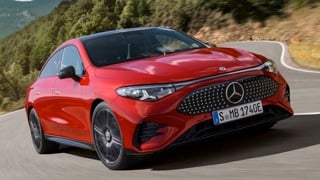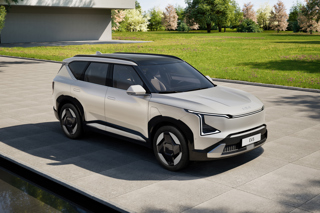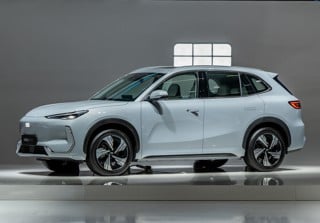Over the past five years, Ford has halved the number of vehicles it sells into the daily rental market – from 90,000 to around 43,000 – as part of a strategy to improve its sales mix and focus on more profitable channels.
It is still the biggest player in rental and views it as a key route to market, not least for the steady churn of nearly new vehicles demanded by its retail network.
But improvements in product quality and design, and enhancements to the support network, have enabled the company to replace some of the rental business with corporate and retail sales.
Ford director of fleet operations Kevin Griffin points to figures that show the carmaker as the market leader in the ‘net fleet’ sector, which removes bodyshop and demonstrators from the SMMT’s true fleet figures, with just over 13% market share, up 3.3% year-on-year.
More broadly, Ford’s total fleet sales reveal a share of 16.8%, ahead of the 15-16% target.
With retail share up at 12%, it has left Ford “short on the ground” for several models, especially the Fleet News Award-winning Focus.
“We have oversold compared to the targets we set,” Griffin says.
It’s an enviable position, particularly for a company that has spent the past 30 years as the UK market leader.
Fleet News: You’ve been reducing sales to daily hire for the past few years but this year you are at a similar level to 2011 – is this process now complete?
Kevin Griffin: Our strategy is to have some volume with every major player, spread around depending on terms and tactics.
We’re about where we want to be now. A lot of the rental volume we control: Ford Rental is 6,000-7,000 units and Ford Retail UK has the rental business in the Channel Islands which is also significant volume.
We buy back most of the vehicles because we know we have demand from dealers.
FN: Your 1.0-litre Ecoboost petrol engine has attracted a lot of media interest: has it a role in the fleet sector?
KG: It gives a viable alternative to diesel and we have some fleets looking at it.
This engine takes 22% of our retail sales but it will take longer in fleet because diesel is dominant and we also have a very good diesel engine. Stage 6 diesel will be a challenge for the industry because it will add cost – the investment is significant.
At that time, more people may consider petrol.
We’ve also found that there is deterioration in diesel particulate filters past 100,000 miles and they are expensive to replace.
On the Focus, our filters go to 150,000. There will be an issue with other vehicles at 100,000 miles and it could affect residual values. This will be an interesting one to watch.
FN: The B-max, which is available in September, is the first UK model to feature your Sync technology. How far can vehicle interactivity go, particularly with safety systems – might they inform the fleet manager of near- misses in future?
KG: This first level of Sync responds to text messages through voice, dials the emergency services in the event of an accident and starts a new level of interactivity that will roll through to the Focus and other models.
The technology on safety systems, such as emergency braking, is loggable and could be transferred to the fleet manager but there are issues with affordability and there is little demand for this now.
The jury’s out on the spy in the cab. I’ve not seen a big take-up outside of the CV market and there is a big question about what you have to do as a fleet manager if you have this information.
However, we have had discussions about electronic technology for the Transit – for example, City Stop and lane departure warning.
There’s quite a bit of interest; it comes down to affordability but it could be made available to customers if they want it.
FN: There’s been a lot of criticism over the official fuel consumption figures. How are fleets reacting to this?
KG: Cost of fuel is paramount to fleets. We are increasingly seeing fleets do their own real-world testing of mpg before they commit to a vehicle, so they want demonstrators for longer to allow this testing.
We need to make sure what we say on the tin after homologation is accurate – and we believe we are.
FN: The next-generation Transit doesn’t require a full service until 30,000 miles. Isn’t this risky for fleets?
KG: Feedback from fleets is that it is desirable for an annual check on safety-related items such as brakes and tyre wear.
We are talking to fleets about a tailored support service, especially on vans – effectively an interim service with duty of care in mind. But we don’t want to add additional cost or downtime so we have to ensure we and the dealer can facilitate an interim service that is less than an hour.
FN: How influential are drivers in deciding which cars are added to a fleet’s choice list?
KG: The halcyon days of solus badged fleets have gone. We have to produce cars that drivers want to be seen in.
Our new Focus has seen a huge uptake in user-chooser volume compared to the old model. The Focus, and to a lesser degree the C-Max, has broadened our appeal with user-choosers. And with the new B-Max we will have an interesting proposition with C-Max, S-Max and Galaxy.
We will be able to offer restricted-badge fleets a unique deal for employees that have a family or need the space.
FN: How much damage do fluctuations in the pound-euro exchange rate cause companies like Ford?
KG: The market has held up well but the exchange rate is an on-going challenge. A 1p change against the euro results in a $30-40 million cost for the business.
You can only price with the market but good product and good business sense – on residual values, reducing inventory – will earn you money and builds trust in the brand.
But we have not made any changes to our strategy as a result of the exchange rate. We will always honour deals, even if they are ones you might want to get out of.
Growth in the user-chooser sector is only part of the fleet success for Ford. The company has invested significantly in its ability to provide bespoke services for companies that require specialist vehicles, such as power/water companies, police and the NHS.
Ford manages the entire process for these fleets, ensuring they only have to deal with one point of contact and one invoice. It requires investment but reaps rewards: specialist services accounts for around 28-29% of Ford’s van sales and 18% of its car sales.
“This type of fleet gets overlooked; it’s a different world to company car policies,” says Griffin.
“Vehicles can be with us for anything from a week to three months undergoing a conversion – it’s an important part of our business.”

















Login to comment
Comments
No comments have been made yet.